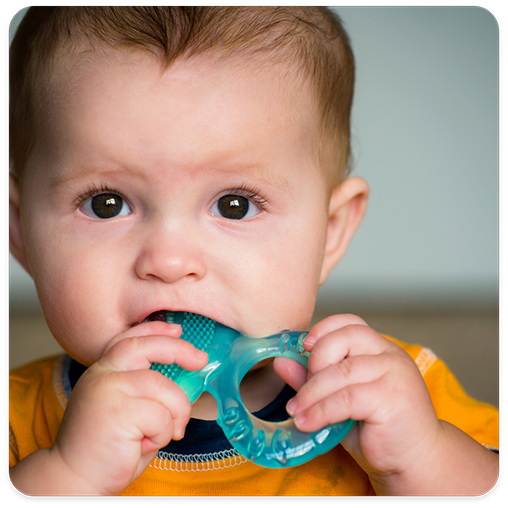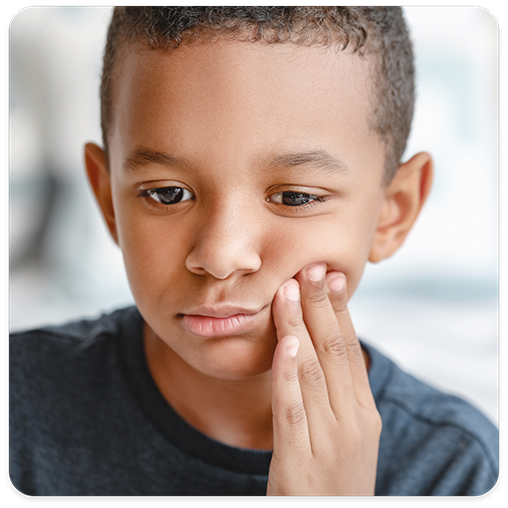Children’s Dentist New Brighton
Giving Young Smiles the Care & Attention They Need

As a parent, you may feel uncertain about how to properly care for your child’s smile. No matter if they’re a toddler or teenager, there are countless issues to be mindful of if their teeth, gums, and bite are to thrive once they reach adulthood. At Crescent Dental, Dr. Helal and our team can educate parents about the risks young smiles tend to face as well as ways to improve oral health year-round. Providing preventive and restorative children's dentistry services, you can count on us to remain by your side as your child grows older each year. Call us today if it’s time for your child or teen to come in for a regular checkup and cleaning.
Why Choose Crescent Dental for Children’s Dentistry?
- Children & Teenagers are Welcome
- Dentist Who Enjoys Educating Patients & Their Parents
- Advanced Technology Used for More Accurate Results
Dental Care for Infants

A problem that can be spotted early is a condition called “baby bottle tooth decay,” which is caused by sugary substances in breast milk and some juices, which combine with saliva to form pools inside the baby’s mouth.
If left untreated, this can lead to premature decay of your baby’s future primary teeth, which can later hamper the proper formation of permanent teeth.
One of the best ways to avoid this problem is to not allow your baby to nurse on a bottle while going to sleep. Also, avoid dipping pacifiers in sweet substances such as honey, as this only encourages early decay in the baby’s mouth. Encouraging your young child to drink from a cup as early as possible will also help stave off the problems associated with baby bottle tooth decay.
Teething, Pacifiers, and Thumb-Sucking

Teething is a sign that your child’s gums are sore. This is perfectly normal. You can help relieve this by allowing the baby to suck on a teething ring, or gently rubbing your baby’s gums with the back of a small spoon, a piece of wet gauze, or even your finger.
For babies under the age of 4, teething rings and pacifiers can be safely used to facilitate the child’s oral needs for relieving gum pain and for suckling. After the age of 4, pacifiers are generally discouraged because they may interfere with the development of your child’s teeth.
Moreover, thumb-sucking should be strongly discouraged because it can lead to malformed teeth that become crooked and crowded.
Primary and Permanent Teeth

Every child grows 20 primary teeth, usually by the age of 3. These teeth are gradually replaced by the age of 12 or so with a full set of 28 permanent teeth, and later on, four molars called “wisdom teeth.”
A child’s primary teeth must be healthy because their development sets the stage for permanent ones. If primary teeth become diseased or do not erupt properly, chances are greater that their permanent replacements will suffer the same fate. For example, poorly formed primary teeth that don’t erupt properly could crowd out spaces reserved for other similar structures. Space maintainers can sometimes be used to correct this condition if it is spotted early enough. Taking a panoramic x-ray in adolescence can help your dentist discover any potential missing teeth or future dental issues.
Brushing

Babies’ gums and teeth can be gently cleaned with special infant toothbrushes that fit over your finger or a small child's toothbrush. Fluoride toothpaste that is the size of a grain of rice is recommended for children under the age of 3 or until they can spit out the toothpaste. Once they reach the age of 3, a pea-sized amount of fluoridated toothpaste may be used. However, you’ll need to teach your child to spit out, not swallow, the toothpaste when finished.
Fluoride

Fluoride is generally present in most public drinking water systems, and it’s found in many foods, like fruits and vegetables. If you are unsure about your community’s water and its fluoride content, or you don’t think your child is getting an adequate amount when using toothpaste to brush their teeth, there are fluoride supplements your dentist can prescribe. This added form of treatment will keep your child’s teeth stronger against any potential dental decay.
Toothaches

Toothaches can be common in young children. Sometimes, toothaches are caused by erupting teeth, but they also could indicate a serious problem.
You can safely relieve a small child’s toothache without the aid of medication by rinsing the mouth with a solution of warm water and table salt. If the pain doesn’t subside, acetaminophen may be used. If such medications don’t help, contact your dentist immediately.
Children’s Dental Injuries

You can help your child prevent oral injuries by closely supervising him during play and not allowing the child to put foreign objects in their mouth.
For younger children involved in physical activities and sports, mouthguards are strongly encouraged, and they can prevent a host of injuries to the teeth, gums, lips, and other oral structures.
Mouthguards are generally small, plastic appliances that safely fit around your child’s teeth. Many mouthguards are soft and pliable when opened and mold to the child’s teeth when first inserted.
If a tooth has been knocked out, try to place it back in its socket while waiting to get to our office. Remember to hold the dislocated tooth by the crown, not the root. If you cannot relocate the tooth, place it in a container of cold milk, saline, or the child’s saliva. You’ll also want to rinse the mouth of any blood or other debris before placing a cold cloth or compress on the cheek, near the injury. This will keep the swelling down.
For a fractured tooth, it is best to rinse with warm water and again, apply a cold pack or compress. Ibuprofen may be used to help keep down swelling. If the tooth fracture is minor, the tooth can be sanded or if necessary, restored by the dentist if the pulp is not severely damaged.
If a child’s primary tooth has been loosened by an injury or an emerging permanent tooth, try getting the child to gently bite down on an apple or piece of caramel; in some cases, the tooth will easily separate from the gum.
Irritation caused by retainers or braces can sometimes be relieved by placing a tiny piece of wax on the tip of the wire or other protruding object. If an injury occurs from a piece of the retainer or braces lodging into a soft tissue, contact our office immediately and avoid dislodging it yourself.

